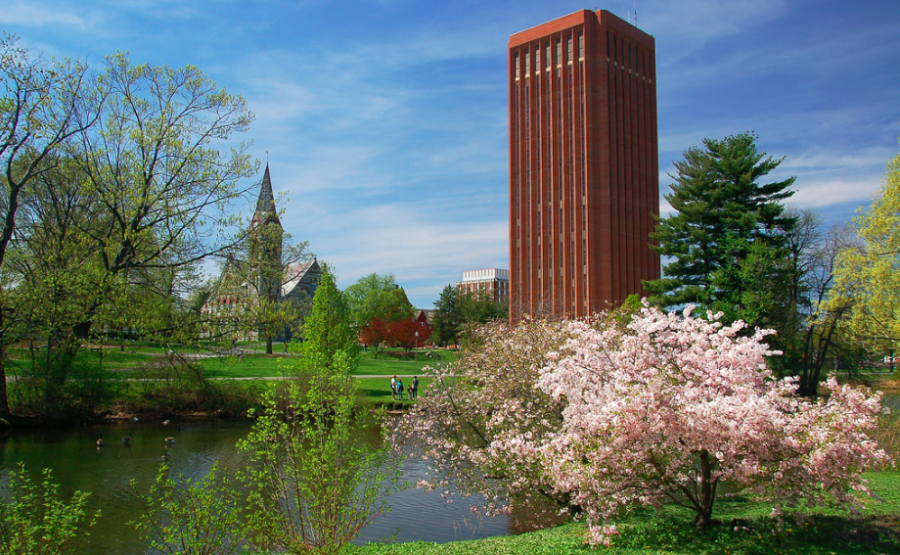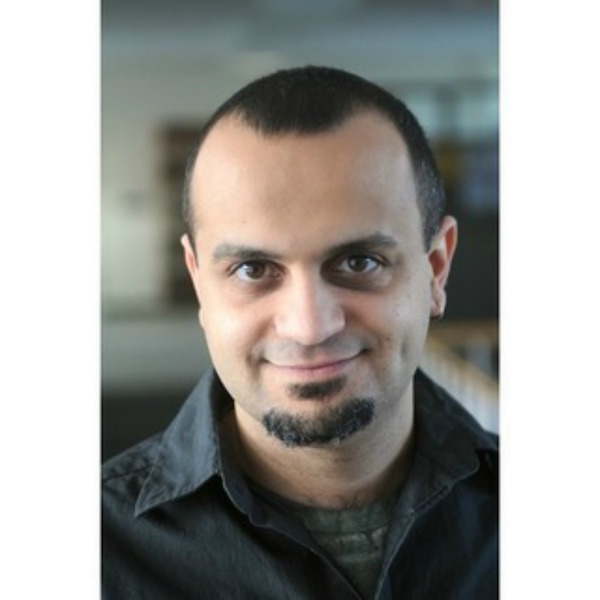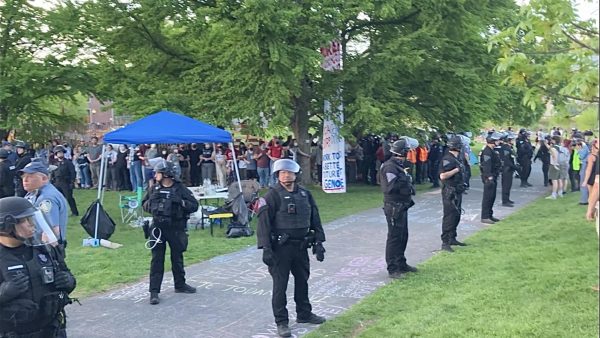Saving the planet one class at a time
AMHERST — Ten faculty members at the University of Massachusetts Amherst were each awarded $1,000 through the Sustainability Curriculum Fellowship (SCF) to grow healthier communities through sustainable energy, agriculture, building design and economic development.
The grants came from the office of UMass Amherst Chancellor Kumble R. Subaswammy, though in previous years the money has been allotted from W.E.B Dubois Library funds.
Each faculty member must use this grant and their position in the fellowship to create a new course or improve on a former course with sustainability-related topics.
Madeleine Charney, the sustainability studies librarian at UMass, explained how the program began in 2013. The grant money was accrued entirely from the library’s sustainability fund.
“If it wasn’t for this fund, I don’t think the program would have even started,” Charney said. “There was a call for professional development in regards to sustainability and how to teach it.”
The fellowship got a boost when the library sent two professors, Bill Woldrich and Will Snyder, to the Association for the Advancement of Sustainability in Higher Education (AASHE) in 2013.
The conference hopes to define sustainability in a more inclusive way. The hope is that attendees will leave with thoughts on how to include human health, environmental health and social justice in their curriculum.
This planning team initiated a search for professors who are committed to augmenting more sustainability in their curriculum through an inclusion of technology and library resources. The curriculum should focus on one or all of the subcategories of sustainability — social, economic, environmental and political.
The following are the fellows and the projects they will be augmenting through the SCF.
The Politics, Science and Physics of Water
Razvan Sibii is the chief undergraduate advisor in the UMass Amherst Journalism Department. Sibii is working with Heath Hatch, a senior lecturer in the physics department, to create a one-credit pilot course discussing issues surrounding water. The course will look at water in physical, scientific and political terms. It will also look at the media’s focus on these terms. The course will be taught in spring 2017.
Real People, Real Food
Boone Shear, the chief undergraduate advisor in the UMass Amherst Anthropology Department, is co-facilitating a course called “Real Food Practicum” and student group, Real Food Challenge.
“We wanted to have a class that could have more intentional work about theorizing food justice and the role Real Food Challenge plays in that,” Shear said.
This spring, he will teach “Sustainability or Sustaining Development?” The class will explore how sustainability can be expressed within capitalist development. Students will investigate alternatives to mainstream approaches.
Shear wants his students to see how people are actualizing projects and movements “to live well with human and non-human others in the world.” He plans to bring in community speakers using the grant funds.
The class is largely informed by economic anthropology and the work of J.K. Gibson-Graham, the joint pen name of feminist Geographers Julie Graham and Katherine Gibson. Graham was a professor in the department of geosciences at UMass Amherst until she passed away in April 2010.
Art and Sustainability
Margaret Vickery is a lecturer in the department of the history of art and architecture at UMass. She teaches a writing course for junior architecture majors. The students will write a final paper focusing on a campus project related to sustainability. They will also create a poster to display in the Student Union.
The second course she is teaching is a freshman seminar entitled “Art of Infrastructure: Nature and the Art of What Sustains Us.”
“Students will get to look at our views of the natural world,” Vickery said.
The students will have the opportunity to explore how we use the earth to supplement our own lifestyles. The students in the seminar will look at projects that have reincorporated nature into the process. Vickery will use the grant to pay for the printing of the posters and for a speaker from the Kestrel Land Trust to talk in one of her classes.
Air Pollution and Health
Krystal Pollitt is an assistant professor in the school of public health and health sciences. She is teaching a class titled, “Air Pollution and Health.” This class looks at air pollution emission, exposure sources and health effects.
“I want to try to get students to look at how to mitigate their exposure,” Pollitt said.
Pollitt plans to use the grant to expand on an old activity from previous sessions of the class. The grant will be used to purchase more exposure sensors. These sensors will quantify diverging exposure levels in different microenvironments on campus, such as construction sites and dining halls.
“We’re really relying on the library and their resources,” Pollitt said.
Pollitt plans to use library case studies as part of
her class assignments. She wants the students to see how air pollution relates to certain populations such as the elderly or children.
Building Leaders in Agriculture, Climate Change and Sustainability
Sarah Berquist is a lecturer in the Stockbridge School of Agriculture who works with the department of sustainable food and farming. The first class she will teach through the fellowship is “Botany for Gardeners.”
Berquist wants to “weed more curriculum into [the class] about sustainability and climate change.”
She will teach another class called “Agriculture, Leadership and Community Education.”
“I hope to help students build skills to be leaders in the fields of agriculture and sustainability,” Berquist said.
With the grant, Berquist hopes to seek professional development by attending conferences. She is interested in attending the Contemporary Pedagogy Conference at UMass Amherst in October and the Wilderness Education and Sustainability Leadership Conference.
She hopes to purchase plants for her students to plant and take care of in their own rooms. She wants students to take a hands-on approach to their learning outside of the classroom as well as within.
Sustainable Infrastructure
Alison Bates is a lecturer in the environmental conservation department. Her class is called “Sustainable Systems — Evaluating Local Solutions.” Students will identify major elements of infrastructure in the world and learn how they can make more sustainable choices.
For a graded group project, students will choose one sector of sustainability: water, transportation, energy, wildlife management, forest and land management or waste and compost management. The groups will work in towns in the Five College area and evaluate the town based on the sector of sustainability they choose.
Each group will also look into how to develop more sustainable solutions and find ways to “communicate science to the public.”
The class will use library data collections and sustainability databases for qualitative and quantitative data analysis.
Nanotechnology and the Environment
Boris Lau is an assistant professor in environmental engineering. Through the fellowship, Lau is teaching a class this semester titled “Environmental Nanoscience and Nanotechnology.” It focuses on how nanomaterials are being synthesized. If released, some materials used in synthesis could have a negative impact.
“Organic solvents used for synthesis may be detrimental to the environment,” Lau said.
Lau hopes his students will look into routes that may be more sustainable. He wants them to think about how nanomaterials can be used to achieve sustainability. Students in this class will write a paper about the application of nanomaterials in environmental settings.
Several fellows were unavailable for comment. Toby Applegate is teaching Geography 102: The Human Landscape through the fellowship, Lorraine Cordeiro is teaching Nutrition 578: Nutritional Issues in Developing Countries and Amilcar Shabazz is teaching AfroAm 222: Black Church in America.
The fellows meet once a month to talk with one another and receive guidance from members of the library. The fellows noted how great it is to hear so many ideas related to sustainability. Since its creation, the program has had fellows from 23 different disciplines.
The planning team for the SCF includes UMass Sustainability Manager Ezra Small, Director of the School of Earth and Sustainability Curt Griffin, Associate Director for the Center for Teaching and Faculty Development Mei-Yau Shih, Associate Director of the School of Earth and Sustainability Darci Maresca and Department of Land Architecture and Regional Planning Professor Mark Hamin.
Email Olivia at [email protected] or follow her on Twitter @O_laramie.











